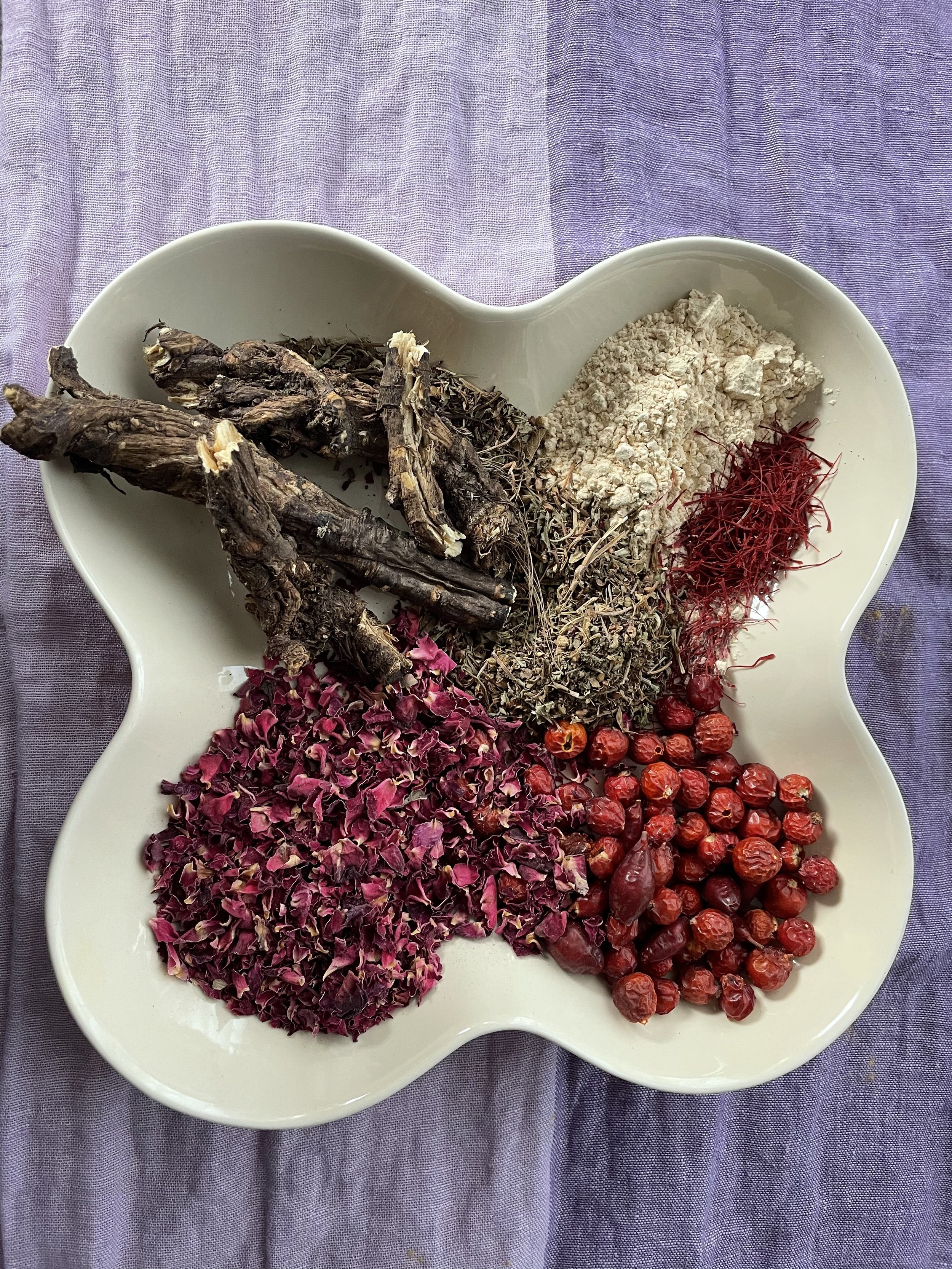Three Powerful Herbs for cold & Flu Recovery
On the enneagram scale I am a 7, “the enthusiast.” At all costs I seek pleasure and avoid pain while also dealing with a constant fear of missing out. Because of this I often find myself juggling multiple interests and activities and I tend to overcommit myself. These are not always great characteristics for my immune system. I overwork and commit myself until my body forces me to stop. This past week I was hit with the flu, so naturally I turned to my herbal allies to support my recovery. Turning to nature's gifts can be a profound way to support our healing process.
Ayurveda, an ancient system of holistic medicine, emphasizes the importance of using natural herbs and remedies to restore balance and promote well-being. This week, I found solace in three potent herbs: Usnea, Osha, and Turmeric. Join me as we explore the therapeutic properties of these herbs from an Ayurvedic perspective, each playing a unique role in rejuvenating the body and enhancing the immune response.
Usnea - The Resilient Lichen
Usnea, commonly known as "Old Man's Beard," is a unique lichen that thrives in forests and moist environments and is abundant in the Rocky Mountains. As you hike look to the trees where you can typically find it draped over branches.
From an Ayurvedic standpoint, Usnea is considered a potent Rasayana, which means it possesses rejuvenative properties. Its bitter and pungent taste corresponds to the elements of air and fire, making it ideal for pacifying Kapha and Vata doshas while supporting lung health.
How Usnea Supports Recovery:
Respiratory Support: Usnea has been traditionally used to address upper respiratory infections, bronchitis, and coughs. Its antimicrobial properties help combat harmful pathogens, while its anti-inflammatory actions soothe irritated respiratory passages1.
Immune Booster: As an immune-modulator, Usnea enhances the body's natural defense mechanisms, making it an excellent aid in recovering from the flu. It helps the body regain strength and vitality1.
Try this recipe for Usnea Tea
Osha root is at the top left of the photo
Osha - The Root of Empowerment
Osha, also known as "Bear Root," is a powerful herb native to the Rocky Mountains. In Ayurveda, it is classified as having a pungent and bitter taste, aligning with the elements of air and ether. Osha is particularly beneficial for calming aggravated Vata and Kapha imbalances, which are often involved in respiratory disorders.
How Osha Supports Recovery:
Decongestant and Expectorant: Osha is renowned for its ability to clear mucus and phlegm from the respiratory tract, offering relief from congestion and facilitating easier breathing2.
Anti-inflammatory: By reducing inflammation in the respiratory passages, Osha aids in alleviating sore throats and irritated tissues, supporting the healing process3.
Try this recipe for Osha Honey
Turmeric - The Golden Healer
Turmeric, often referred to as the "Golden Spice," is a staple herb in Ayurvedic medicine. It has a bitter, pungent, and astringent taste, corresponding to the elements of fire and air. Turmeric is believed to be tridoshic, meaning it can balance all three doshas: Vata, Pitta, and Kapha.
How Turmeric Supports Recovery:
Anti-Viral Properties: Curcumin, the active compound in turmeric, has potent antiviral effects that can help combat the flu virus and speed up recovery4.
Anti-Inflammatory Actions: Turmeric's renowned anti-inflammatory properties assist in reducing swelling in the respiratory passages and provide relief from discomfort4.
Enhances Digestion: Ayurveda emphasizes the importance of strong digestion for overall health. Turmeric supports the digestive fire (Agni), which is vital during recovery, as it aids in assimilating nutrients from food and herbal medicines.
Try this recipe for Turmeric Golden Milk
Incorporating Ayurvedic wisdom into our healing journey can offer profound benefits for recovering from the flu and respiratory symptoms. The trio of Usnea, Osha, and Turmeric provides a holistic approach to supporting the body's innate ability to heal and restore balance. As we embrace the gifts of nature, we also cultivate a deeper connection with the ancient wisdom of Ayurveda, reminding us that in harmony with the natural world lies the key to our well-being. However, it is essential to consult an Ayurvedic practitioner or healthcare professional before incorporating these herbs into your regimen, especially if you are pregnant, nursing, or have pre-existing health conditions. May your path to recovery be one of healing, rejuvenation, and empowerment.
References
Rogers R. The Fungal Pharmacy: The Complete Guide to Medicinal Mushrooms and Lichens of North America. November 15, 2011
Myhal N. Ethnobotany of Oshá (Ligusticum porteri) and Policy of Medicinal Plant Harvest on United States Forest Service. Indigenous Studies and the Graduate Faculty of the University of Kansas. 2017
Nguyen K, Sparks J, Omoruyi FO. Investigation of the cytotoxicity, antioxidative and immune-modulatory effects of Ligusticum porteri (Osha) root extract on human peripheral blood lymphocytes. J Integr Med. 2016 Nov;14(6):465-472. doi: 10.1016/S2095-4964(16)60280-7. PMID: 27854198.
Hewlings SJ, Kalman DS. Curcumin: A Review of Its Effects on Human Health. Foods. 2017 Oct 22;6(10):92. doi: 10.3390/foods6100092. PMID: 29065496; PMCID: PMC5664031.
Disclaimer: Recommendations, not medical advise. The information provided in this article is for educational purposes only and is not intended to diagnose, treat, cure or prevent any disease. It is not a substitute for professional medical advice. Always consult your healthcare provider before using any herbs or supplements, especially if you have a medical condition or are taking medication. The author and publisher of this article are not responsible for any adverse reactions, effects, or consequences resulting from the use of any of the suggestions or preparations discussed in this article.


